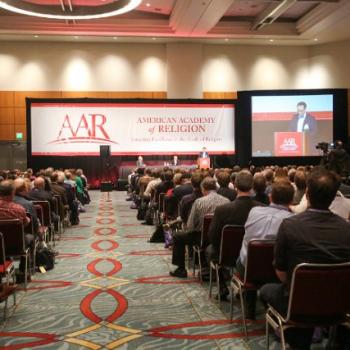Simon Joseph has kindly blogged about Richard Carrier’s appearance at a regional SBL meeting. Here is an excerpt from towards the end of the post:
The fact that an SBL regional meeting was hosting a review and discussion of Carrier’s book was intriguing. Richard Carrier is one of the few exceptions among those who doubt the existence of Jesus in that he is a Ph.D. in Ancient History. His book, published by a respected university press, marks a milestone in the history of Mythicism. It is certainly the most vigorous effort yet to challenge the so-called “Historicist” position. To be honest, I didn’t expect to see much productive discussion between Carrier and his respondent, Kenneth L. Waters, Sr.. Waters, after all, is an Azusa Pacific University professor, ordained minister, and former pastor and Carrier is an avowed atheist. While I expected them to talk past each other, I was curious to see how the formal setting of an SBL meeting might influence the discussion on this controversial topic, especially since Carrier’s online critiques have been noted for their polemical tone. After all, if the Mythical Jesus theory reflects a dispassionate interest in the historicity of Jesus, then it is subject to the same academic rules of engagement: review, critique – and possible rejection – in whole or in part. A scholar’s arguments may not convince their colleagues, but it is this submission to the rules of engagement that makes scholarship a discipline.
Carrier was clearly aware that he was not preaching to the choir. He summarized his central thesis – that Jesus originated as a celestial myth about a crucified dying-and-rising savior god. According to Carrier, “Jesus” never existed except as an imaginary celestial being who telepathically communicated and appeared to hallucinating “disciples.” The figure of “Jesus” was then historicized via a process known as “Euhemerization.” Carrier assumes a formidable burden of proof in arguing against the consensus of scholarship on multiple fronts. He dismisses Josephus’ references to Jesus. He reads Paul’s Jesus as exclusively celestial. He denies that Jesus had a brother named James. He dismisses the Gospels as historically useless. He denies the existence of Q. He dismisses the criteria of authenticity as completely invalid. And he claims to have found evidence for a pre-Christian Jewish celestial Dying Messiah tradition. Any one of these contested claims – if established – would alone be a significant contribution to scholarship. But to combine them all at once while calling for a fundamental paradigm shift in Jesus Research and historical methodology is to court controversy and, well, rejection.
Unsurprisingly, Waters was unconvinced. He rejected Carrier’s argument about James as “untenable” and insisted that Paul’s reference to Jesus being “born of a woman” was a typical example of Pauline thought “habitually and typically” conflating history and allegory. Waters pointed out that there is simply no evidence of “a crucified Celestial Christ in any literature” and criticized Carrier’s use of “relatively obscure texts” (like the Ascension of Isaiah and Philo) to construct his celestial Christ myth. He dismissed the idea that various “Mediterranean fables” provide compelling similarities to Jesus and pointed out that we have no evidence of any Christian or non-Christian critique of a Mythical Jesus. Carrier responded by pointing out that we don’t have enough evidence to falsify this argument from silence, noted that Waters didn’t provide any evidence of Jesus’ historicity, and accused him of “ignoring” the scholarship on the Ascension of Isaiah and getting Philo “all wrong.” According to Carrier, Waters’s emphasis on the differences between Jesus and the savior gods of antiquity was simply “terrible methodology.”
In the end, the audience asked questions, nothing was resolved, and we all went home. This was not an attempt for two ideologically opposed world-views and thought-systems to engage the other and negotiate common ground. No, it was two ideologically opposed world-views holding their own ground in parallel universes with “Jesus” as the central site of discursive conflict, illuminating once again, that “Jesus” is cultural capital in ideological struggles for power. But that’s a post for another day.
Click through to read the rest.
Of related interest, CNN has an article about whether Jesus had a brother.
UPDATE: soon after posting this, I spotted some posts from earlier today on blogs I read, which are also relevant. Jonathan Bernier blogged about Carrier’s book, and Daniel Gulotta blogged about Bart Ehrman’s recent book about Christology. Here is an excerpt from Bernier’s review to whet your appetite:
Carrier’s got a bright idea, but that’s all. That bright is that there is a 2 in 3 chance that Jesus did not exist. That doesn’t tell me that Jesus did not exist. In fact, “Did Jesus exist?” is not even Carrier’s question but rather “Is there a conceivable world in which Jesus did not exist?” And the answer to that is “Yes.” But that’s not enough. One must further ask “Is that world the one that best accounts for the totality of the relevant data?” Does it account for the most data whilst adopting the fewest suppositions? Does it resolve problems throughout the field of study, or does it in fact create new ones? And on those matters Carrier fails, as has been shown repeatedly by various NT scholars, professional and amateur, here on the interwebs (which, one should note, is just about the only place that this “debate” is taking place. It’s certainly not taking place in the academy. Kinda like what fundamentalist Christians euphemistically call the evolution “debate”; the debate, it turns out, exists primarily in their heads).
I can conceive of many things. I can conceive of a world that sprang into being fully-formed last Tuesday, with all our memories and the appearance of age prefabricated by a deity named Goozawana. But conceiving of such a world does not make it so. There is a reason that we distinguish between fiction and history. The objects are different. One aims to suggest what might be, the other to define what actually was. That’s a significant difference. I have yet to see Carrier move beyond the realm of the what might be into the realm of what is. I’ll check back when he does.












